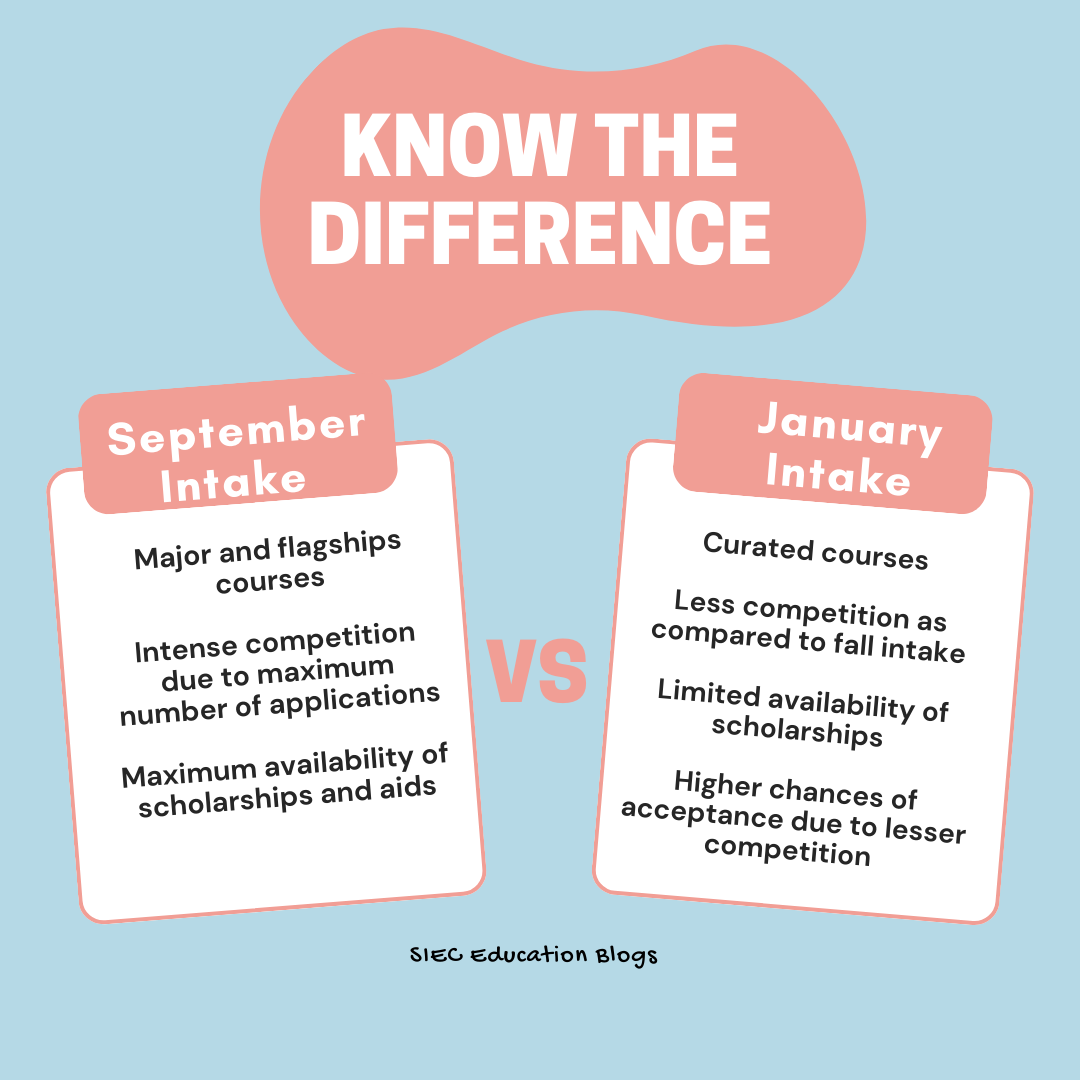
Updated On: 31 October 2025
Study abroad: How to decide between September and January intakes?
A very important decision rests on the choice between September intake and January intake for university admission. Whatever the intake may be, it is sure to have consequences on the academic and career path of an individual. Each of the two intakes has advantages of its own; thus, it is crucial to think through with respect to individual academic goals, personal situation, and professional plans. Here are some pointers for you to decide between September and January Intake.
- Deciding about choosing between September and January intakes is very, very critical to the study because it may mold the path of one's life.
- Both have their pros and cons, so choose the one that matches with one's academic goals, personal situation, and career plans.
A perennial debate relives in the minds of students aspiring to study abroad regarding which intake would be most suitable for them. While both September and January intakes have their distinct advantages, they also carry distinct challenges, thus making it really tough for even international students to decide.
Read More: Top 10 study abroad consultants in Delhi
How to decide between September and January intakes?
The key to overcoming this dilemma lies in comprehending their differences and choosing the one that is most in tune with the person's individual academic objectives, career aims, and preferences. Here are a few points to help make a decision on how to decide between September and January Intake:

The September Intake: The Fall Advantage
However, most universities worldwide have September, commonly referred to as "fall intake," as their main admission window. This is the reason why the September intake is most often chosen by international students from countries like the US, Canada, and the UK.
- Since this is the main cycle for college registrations, almost all undergraduate or postgraduate programs are generally available for admission in this intake.
- In other words, this is the broadest intake with options in competitive fields such as engineering, business, or medicine.
Scholarships, financial aid have become the most sought-after avenues to pursue higher education for the students coming from the economically not-so-strong backgrounds/parents for wanting to study independently.
- This intake is when students get to avail some of the highest areas of scholarships; they also access the larger funding pool.
- Several internship, research, and extracurricular opportunities also happen around this semester, which fits perfectly into the global hiring cycles and enhances immediate job prospects after course completion.
You may also like: Degrees That Will Be in Demand in 2027: Insights from the World Economic Forum
The January Intake: Gateway to Winter Paradise
The January intake, known as winter semesters among other names, is a secondary opening for international students to enroll into some top universities abroad. Though in no match to the September intake, it is an excellent option for a student who still needs to prepare further and is also for one who has missed deadlines for the September intake.
- Almost all programs available in January cycles allow students to prepare for the subsequent months.
- For example, improve standardized tests scores, gain relevant work experience or arrange finances, this can be a very good time for building a stronger academic profile.
Since most students go for the September intake, the size of classes in this intake is relatively small.
- Because of these small cohorts, students are given more personalized attention by their faculties.
- The January cycle also allows students to choose from an array of tailored programs especially designed to give industry-specific and job-ready skills.
Read More: Benefits of Applying for the January Intake
Challenges
But admission to the September intake is quite tough, for indeed it is the most sought-after time for intake.
- The overall heavy competition comes in the form of an avalanche of applications for admission to top programmes in elite institutions, further compounding its difficulty.
- The relative strict deadlines just add another factor of hardness.
- The application deadlines for the September intake usually fall between December and February.
This means early preparation of academic documents, test scores, and visa requirements.
The January cycle is equally strenuous for international students, much like the September intake, to factor in while planning studies abroad.
- They have limited scholarships and misaligned hiring cycles, which makes it difficult for students opting for certain career paths.
- As with all options, the decision is to take the January intake should be well aligned with their own personal and professional goals.
Conclusion
When choosing between the January and September intakes, students must contemplate critically the priorities that matter to them most. Some of these priorities include the availability and readiness of the program, opportunities for financial aid, and considerations that address timing of their careers.
For students who want to take advantage of a wider range of courses, available funding options, and synchronization with the global hiring cycle, September would be an ideal intake. Conversely, January intake would provide maximum flexibility, not overly competitive applications, and a timely option for students who subscribe to the planner less method, in addition to that, students can also study in smaller cohorts.
Essentially, right timing and convenience define the ideal intake along with the very right fit for a student's academic and career aspirations. Students can, however, succeed at any chosen path given that they've done proper planning and preparation.
Thus, the choice of international students should be the option best suited to their purposes, and they should move forward into the journey confidently.
Reach out to SIEC for Application inquiries and assistance.
Read more insightful articles:
Why You Should Consider Applying for January Intake in UK?
Staying in India vs. Going Abroad: Key factors to consider
How to Overcome Culture Shock While Studying Abroad?



Comments (0)
Leave a Comment